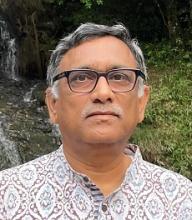School of Environmental Sciences (SES) was established in 1974 and is the first of its kind institute in Jawaharlal Nehru University too keep environmental curriculum at the forefront by initiating innovation, fundamental, inter-disciplinary and multi-disciplinary courses that meet the needs of the society by integrating the physical, geological, chemical and biological aspects of the environment.
Vision
To achieve leadership through excellence in research and innovation by providing quality education to address environmental challenges for the sustainable management of earth systems.
Mission
-
• Impart high quality education and research in the environmental sciences to improve the quality of life.
-
• To empower researchers from diverse disciplines to work together to solve pressing environmental challenges in collaboration with concerned agencies to ensure sustainability of eco-environmental systems.
-
• To address management of natural resources in all climatic environments through innovative, integrated, interdisciplinary and multidisciplinary approaches.
-
• Identifying future eco-environmental challenges.
-
• To provide environmentally sustainable solutions for the pressing problems of the society by closely working with the stakeholders.
Objectives
-
• A robust and interdisciplinary framework of teaching and research programs from diverse disciplines to solve pressing environmental and ecological challenges
-
• To carry out activities which have direct impact on society i.e. promoting sustainable environmental practices.
-
• To develop understanding of environmental issues such as climate change, human health, and air, land & water resources conservation and management as well as renewable energy.
-
• Aligning research in accordance with the appropriate themes of the sustainable development goals (SDGs) and other national and global pressing environmental interests.
As a Dean of SES, I actively play my role to facilitate students to become best academicians, researchers and policy makers. I provide diverse and inclusive work environment to my colleagues and driving them wherever necessary to play a role in getting utmost national and international agencies support to the school. A collaborative and integrated approach towards teaching, learning and research will be emphasized. I strongly believe that the SES faculty will overcome the constraints facing to deliver the best scientific services to the society and reach the desired goals.

Prof. N. J. Raju
Dean, SES